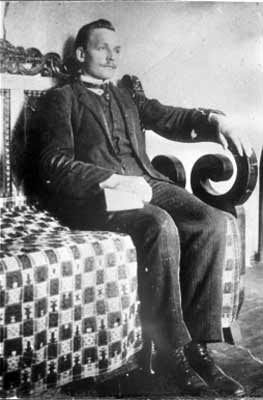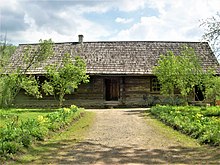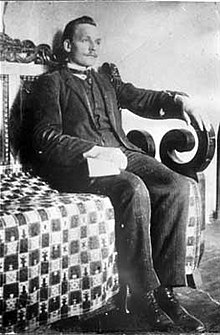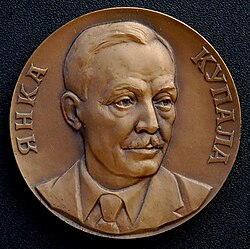Quick Facts
Also Known As: Janka Kupała, Ivan Daminikavič Lutsevič
Died At Age: 59
Born Country: Belarus
Poets
Belarusian Men
Died on: June 28, 1942
place of death: Moscow, Russia
Cause of Death: Accidental Fall
Childhood & Early Life
Yanka Kupala was born to Daminik Anufryevich and Bianigna Ivanauna, on July 7 (O.S. June 25), 1882, in Viazynka, near Maladzyechna, in Belarus. The young child was christened Ivan Daminikavich Lutsevich, and registered as a member of the noble Lutsevich family.
Though belonging to the gentry, Ivan’s family were reduced to landless labourers. The family consisted of many children, and young Ivan was the eldest. In the 1870s, the family was displaced and had to move from one village to the other for sustenance.
As a schoolboy, Ivan was drawn by the charms of Belarusian folklore that was taught in the various schools he attended. In 1898, he completed his education from a public school in the district of Bialaruchi.
In 1902, his father passed away, and Ivan started working odd jobs like tutoring, helping at shops and keeping records.
Continue Reading Below
Career
In 1903-04, Kupala used the pen name ‘K-a’ to write his first major Polish poem titled ‘Ziarno’.
During this time, the budding poet took a major decision to start writing in Belarusian. On July 15, 1904, he wrote his first Belarusian poem called ‘Мая доля’ (‘My Destiny’). The poem spoke about the common man and his journey through a life of oppression.
In 1905, another poem, ‘Мужык’ (‘Peasant’) was printed by ‘Severo-Zapadnyi Krai’, a Belarusian newspaper. This poem dealt with a village labourer who is faced with issues of confidence and self-respect.
From 1906-07, several other poems by Yanka, written in his native language, was published by the Belarusian weekly, ‘Nasha Niva’.
The poet settled down in Vilnius, the capital city of Lithuania, Northern Europe, in 1908, and published a compilation of poems titled ‘Жалейка’ (‘The Little Flute’). The book was seized and Kupala was arrested on claims that his poetry was against the Czar and his government.
In 1909, even though the poet was released, another book by him was impounded. Yanka did not wish to put the newspaper ‘Nasha Niva’ into trouble, and stopped getting his literary works printed by them.
The same year, the brilliant poet travelled to Saint Petersburg in Russia, where several of his works were duly published. His poems, like ‘Адвечная песьня’ (‘Eternal Song’) and ‘Сон на кургане’ (‘Dream on a Barrow’), showed influences of Russian writer, Maxim Gorky’s literary style.
In 1913, he came back to Vilnius and began writing for the weekly ‘Nasha Niva’. During the next few years he regularly met with famous Russian and Polish writers like L. Gira and V. Briusov. The latter had a profound impact on Yanka’s writings, and he also translated some of the Belarusian poems into Russian.s
In 1915, he moved to Moscow, and pursued courses in History and Philosophy at the city’s ‘Shanevski People’s University’.
Continue Reading Below
The ‘Bolshevik Revolution’ took place, in October, 1917 and as a result, local soviets came into power after the defeat of the Russian provisional government. From then on, the talented Belarusian poet’s literary works were marked by a more optimistic tone.
Towards the end of 1918, Kupala became disillusioned with the ‘Bolshevik Revolution’ and wrote poems like ‘For My Native Land’, ‘The Song’, and ‘To My People’. Through these poems he urged the Belarusians to come together and fight for their rights.
Yanka translated the left-wing anthem, ‘The Internationale’, into his native tongue, in 1919-20, at the same time maintaining a nationalist point of view. During the same period, he started residing in Minsk, Belarus, where he was employed as a librarian at the ‘People’s Commissariat of Education’ simultaneously writing for the magazine ‘Volny Stsiag’.
In the next decade, from 1921-30, he helped establish the ‘Belarusian State University’, the ‘National Theatre’, and the ‘Institute of Belarusian Culture’, which later came to be known as the ‘Belarusian Academy of Sciences’. During this time Kupala set up many publishing houses and printed his books of poetry, like ‘Heritage’ and ‘The Unknown’.
For the next few years, a depressed Yanka did not produce many poems, owing to ideological differences between him and the ‘Belarus Communist Party’, which further led to emotional turmoil for the poet.
In 1941, the Nazis of Germany took over Belarus, and the exceptional poet had to move from Minsk to Moscow, and later to the Republic of Tatarstan, due to his failing health. Even while being away from his homeland, he wrote poems with the same nationalist fervour, supporting the cause of Belarusian freedom from the Nazis.
Major Works
Amongst the numerous poems and plays that Kupala has written, ‘Ад сэрца’ (‘From the Heart’) is one of the most popular works. The collection contains a poem titled ‘The Destiny of Taras’, which describes the life of famous Ukrainian writer, Taras Shevchenko. The book also contains other poems that had been penned during 1937-39, eulogising the Soviet rule.
Awards and Achievements
In 1925, Yanka Kupala was named the ‘National Poet of Belarus’, by the state institution, ‘Council of People’s Commissars of the Belarusian Soviet Socialist Republic’ (‘BSSR’). He became the first Belarusian writer to earn the honour, and was entitled to earn lifelong pension.
This prolific Belarusian writer was felicitated with the ‘Order of Lenin’, the highest award given by the Russian government, in 1941, for his compilation of poems titled ‘Ад сэрца’ (‘From the Heart’).
Continue Reading Below
Personal Life & Legacy
In January 1916, Kupala got married to a woman named Uladzislava Frantsauna Stankevich.
The poet died in 1942, after slipping off the staircase at Hotel Moskva, in Moscow. Though the death was declared as an accident, there are speculations of him having been assassinated by informers of Stalin, the Soviet dictator.
Belarusian literature courses include a specialised area called ‘Kupalaznaustva’ which is a detailed study of the poet’s work. His poems and plays are also a part of the curricula in the country’s schools.
His works have been translated into several languages, including the poem ‘And, Say, Who Goes There?’ which has been rewritten in English, Arabic, Italian, Chinese, German, Hindi, and Japanese, amongst others.
The ‘Yanka Kupala State Literature Museum’, in Minsk, Belarus, is named after the accomplished poet.
He is the eponym for villages, farms, schools, and streets, not just in his homeland, but also in countries like Ukraine, Uzbekistan, Russia, Poland and Georgia.
The ‘Kupala Literary Prize’ and the ‘Kupala State Prize’, which are awarded to exceptional poets and dramatists, have been named in honour of the Belarusian writer Yanka.
In 1982, UNESCO celebrated the hundredth birth anniversary of this peerless poet, and twenty five years later, his birth anniversary was observed by Belarus, on a national level.
Trivia
This famous poet is often compared to fellow Belarusian writer Yakub Kolas, who was also declared the National Poet of the country. Both poets were born in the same year, wrote patriotic poems and faced opposition from the government for doing so.
Ivan Daminikavich Lutsevich best known with the pen name Yanka Kupala was a Belarusian poet and writer. Born on June 25, 1882, Yanka Kupala is one of the greatest Belarusian language writers of the 20th century. His resistance to all odd and the pursuitof writing his poems in the Belarusian language although Russian was the official language at the time made him a national hero. With this posture, Yanka Kupala was considered as a symbol of the culture of Belarus during the Soviet era. Authorities pursued him for most of the poems he published but was never perturbed and did not change his tone and theme of writing.
Early Life
His parents worked as tenant farmers at the folwark as they were landless. Kupala had a traditional Belarusian education and completed in 1898. At age 20, Yanka Kupala lost his father and had to pick on short-term jobs like a shop assistant, record keeper, and teaching.
Career
Yanka Kupala started his career as a poet under the pseudonym «K-a» and came out with his first poem Ziarno, which was completed between 1903 to 1904. Though Russian was the official language in his country at the time, Yanka Kupala was still bent on writing in the Belarusian language and came out with his first poem in that language titled «??? ????» on July 15, 1904. All this while, none of his poems had been published, and that yoke was broken with the poem «?????» which was published on May 11, 1905, in Belarusian in the Russophone Belarusian newspaper Severo-Zapadnyi Krai. From 1906 to 1907 some of his poems were published in the Nasha Niva newspaper in the Belarusian-language.
In Vilnius And St. Petersburg
In 1908 Yanka Kupala traveled to Vilnius to continue with his poetry career. While there he published his first collection of poems titled??????? (The Little Flute). This publication angered the czarist government who saw the book as a threat and therefore labeled it as anti-government publication and ordered all copies to be confiscated. In 1909, in order to arrest Yanka Kupala was terminated, but all future publications of the book were confiscated by the local authorities in Vilnius. To save the Nasha Niva newspaper from troubles with the government, Yanka Kupala stopped any further publications of his works by them.
Yanka Kupala then set off to St. Petersburg in 1909 where he published most of his works including ???????? ?????? (Eternal Song) ??? ?? ??????? (Dream on a Barrow) which was set on the poor state of his homeland. In 1913, Yanka Kupala returned to Vilnius where he started working with Nasha Niva. Yanka Kupala kept contact with famous Russian and Polish writers like L.Gira and V Brusov. Brusovhad an impact on Yanka Kupala writings and was used to translating some of his works into Russian. To further his education, Yanka Kupala moved to Moscow to pursue a course of History and Philosophy at the Shanevski People’s University.
During The Soviet period
After the Great October Revolution of 1917, Yanka Kupala usual tone and theme began to change into a more optimistic one. Yanka Kupala translated the internationalist-Marxist anthem, The Internationale into Belarusian language and also the epic poem The Tale of Igor’ss Campaign in 1921. His anti-Soviet posture still persisted and maintained a strong connection with the anti-Soviet oriented emigres of the Belarusian People’s Republic who also asked him to join them in exile in Czechoslovakia. During the Nazi Germany of Belarus, he moved to Moscow and later to Tatarstan. During this period, Yanka Kupala wrote in a nationalistic way. Kupala died in1942 aged 59 in Moscow when Yanka Kupala fell from the staircase in Hotel Moskva.
Honors
Yanka Kupala was named after Hrodna State University and also a theatre in Minsk. His monument is cited at the Arrow Park in Monroe, New York and also has a monument at the city of Ashdod in Israel. In 1941, he was awarded Order of Lenin for his poetry collection?? ????? (From the Heart).
Yanka Kupala is a Belarusian poet and writer.
Kupala is one of the greatest Belarusian writers of the 20th century.
He was born on the 7th of July in
1882 in Viazynka.
His first serious literary
attempt was Ziarno.
It is in Polish
language. It is a poem.
His first published poem was «Peasant»
He lived in
Vilnius and in St. Petersburg.
His poems
are “The Little Flute”, “Eternal Song”, “Dream on a Barrow”,
“From
the Heart”.
Kupala is a symbol of culture of Belarus.
Hrodna State University was named after
Yanka Kupala.
There is also a park named after him with his monument
There is a theatre named after him
in Minsk.
In New York there is a monument of Yanka Kupala.
A monument to
Kupala is placed on a square in Ashdod in Israel.
Янка Купала Беларус
| Категория реферата: Топики по английскому языку
| Теги реферата: реферат на тему мир, конспект по русскому
| Добавил(а) на сайт: Дресвянин.
Янка Купала
Нарадзiỳся Янка Купала (Iван Дамiнiкавiч Луцэвiч) ỳ сям´i малазямельнага арандатара ỳ ноч на 7 лiпеня (25
чэрвеня) 1882 года недалека ад Мiнска, у фальварку Вязынка. Нараджэнне яго супала са старажытным народным святам Купалля, назву якога паэт узяỳ у
якасцi псеỳданiма. Закончыỳшы Бяларуцкае народнае вучылiшча (1898), Янка Купала вучыỳся на агульнаадукацыйных курсах Чарняева ỳ
Пецярбургу (1909 – 1913), у Маскоỳскiм унiверсiтэце Шаняỳскага (1915). Пасля смерцi бацькi (1902) працаваỳ вандроỳным
настаỳнiкам (дiрэктарам), пiсарам у судовага следчага ỳ Радашковiчах, малодшым прыказчыкам на Сенненшчыне, практыкантам i памочнiкам
вiнакура на броварах у маёнтках. У 1908 годзе Янка Купала прыехаỳ у Вiльню, дзе працаваỳ бiблiятэкарам у прыватнай бiблiятэцы “веды”
Данiловiча i супрацоỳнiчаỳ у газеце “Наша нiва”. З кастрычнiка 1913 года зноỳ у Вiльнi, супрацоỳнiк “Беларускага выдавецкага
таварыства”, рэдактар “Нашай нiвы” (1914 – 1915).
У студзенi 1916 года Янка Купала быỳ прызваны ỳ армiю: служыỳ у Мiнску, Полацку i Смаленску. Пасля абвяшчэння БССР пераехаỳ са Смаленска нак сталае жыхарства ỳ Мiнск. Працаваỳ загадчыкам бiблiятэкi пры
Беларускай хатцы, рэдагаваỳ часопiсы “Рунь” i “Вольны сцяг”, быỳ адным з iнiцыятараỳ стварэння Беларускага дзяржаỳнага унiверсiтэта, Iнстытута беларускай культуры, аб´яднання “Полымя”. У 1925 годзе яму было прысуджана званне народнага паэта Беларусi.
Хваля арыштаỳ, якая ỳлетку 1930 года пракацiлася сярод белпрускiх пiсьменнiкаỳ, дзеячаỳ навукi i культуры, не абмiнула i Янку Купалу. Яго рэгулярна выклiкалi на допыты ỳ ДПУ, патрабавалi паказанняỳ аб “контррэвалюцыйнай” арганiзацыi “Саюз
вызвалення Беларусi”, лiдэрам якой ён нiбыта быỳ. Даведзены да адчаю, ён 27 лiстапада 1930 года зрабiỳ спробу самагубства. На шчасце,жыццё паэта
ỳдалося выратаваць. У гады Вялiкай Айчыннай вайны жыỳ у пасёлку Пячышчы каля Казанi i ỳ Маскве.
Трагiчна загiнуỳ у гасцiнiцы “Масква” 28 чэрвеня 1942 года. Пахаваны ỳ Маскве, а ỳ 1962 годзе урна з яго прахам была
перавезена ỳ Мiнск на вайсковыя могiлкi.
Выполніл: Вжос Сергей 10 “Д”
Скачали данный реферат: Игнатьев, Alevtina, Шубин, Жозефина, Cyganov, Татьяна, Vonifatij, Janin.
Последние просмотренные рефераты на тему: реклама реферат, реферат на тему развитие, предмет культурологии, сжатое изложение.
1
|
Quick facts for kids Yanka Kupala |
|
|---|---|
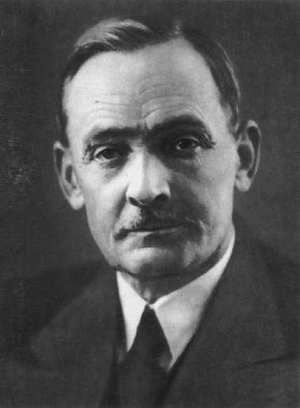 |
|
| Born | July 7 [O.S. June 25] 1882 Viazynka, near Minsk, Belarus |
| Died | June 28, 1942 (aged 59) Moscow, Russia |
| Occupation | Poet and writer |
| Nationality | Belarusian |
| Period | 1903–1942 |
Yanka Kupala (July 7 [O.S. June 25] 1882 – June 28, 1942) was the pen name of Ivan Daminikavich Lutsevich. He was a Belarusian poet and writer. Kupala is said to be one of the greatest Belarusian-language writers of the 20th century.
Contents
- Biography
- Early life
- In Vilnius and St. Petersburg
- During the Soviet period
- Images for kids
Biography
Early life
Kupala was born on July 7, 1882 in Viazynka. His family was of Szlachta origins. Both of his parents were tenant farmers. Kupala received a traditional Belarusian education. He finished his studies in 1898. After the death of his father in 1902, Kupala worked several short-term jobs. These included being a tutor, a shop assistant, and a record keeper.
Kupala’s first serious try at writing was Ziarno. It was a Polish-language sentimental poem which he completed around 1903–1904. His first Belarusian-language work («Мая доля») was dated July 15, 1904. Kupala’s first published poem, «Мужык» («Peasant»), was published about a year later. It was in the newspaper on May 11, 1905. Several more poems by Kupala were in the Belarusian-language newspaper Nasha Niva from 1906 to 1907.
In Vilnius and St. Petersburg
Yanka Kupala during his study under a professor A. Charniaev in Saint Petersburg, 1909
Kupala moved from Belarus to Vilnius in 1908. He continued with his career as a poet. The first published collection of his poems, Жалейка (The Little Flute) made the czarist government mad. The order for Kupala’s arrest was ended in 1909.
Kupala left for St. Petersburg in 1909. In 1910 he published several works. He left St. Petersburg and returned to Vilnius in 1913. Among those influencing Kupala in the 1910s was Maxim Gorky.
During the Soviet period
Kupala’s writing changed to an optimistic tone after the Great October Revolution of 1917.
Kupala was awarded the Order of Lenin in 1941 for the poetry collection Ад сэрца (From the Heart).
In 1941 he moved to Moscow and then to Tatarstan. But even from there he wrote poems supporting Belarus fighting against Nazi Germany. He died mysteriously in 1942 in Moscow. He fell down the stairwell in Hotel Moskva. The death was said to be accidental.
Images for kids
-
Monument at the Yanka Kupala Park in Minsk
-
A monument to Yanka Kupala in Ashdod, Israel
-
House where Janka Kupala was born (folwark Viazynka, Minsk district, Belarus)
All content from Kiddle encyclopedia articles (including the article images and facts) can be freely used under Attribution-ShareAlike license, unless stated otherwise. Cite this article:
Yanka Kupala Facts for Kids. Kiddle Encyclopedia.
From Wikipedia, the free encyclopedia
|
Janka Kupala |
|
|---|---|
 |
|
| Born | July 7 [O.S. June 25] 1882 Viazynka, Minsk Governorate, Russian Empire |
| Died | 28 June 1942 (aged 59) Moscow, Soviet Union |
| Occupation | Poet and writer |
| Nationality | Belarusian |
| Period | 1903–1942 |
Yanka Kupala, also spelled Janka Kupała (Belarusian: Янка Купала; July 7 [O.S. June 25] 1882 – 28 June 1942), was the pen name of Ivan Daminikavič Lutsevič (Іван Дамінікавіч Луцэвіч), a Belarusian poet and writer.
Biography[edit]
Early life[edit]
Janka Kupala during his study under professor A. Charniaev in Saint Petersburg, 1909
Kupala was born on July 7, 1882, in Viazynka, a folwark settlement near Maladzyechna. His family had been well-known since the early 17th century, coming from the szlachta, although grown poor so both of his parents had to work as tenant farmers at the folwark. Yanka’s grandfather leased the land from the Radziwiłł family who eventually expelled him from his home. The story later formed the basis of Kupala’s drama ‘The Ravaged Nest [be]’. Young Ivan had to help his father support the family. When his father died in 1902 he became the only provider. He worked a variety of short-term jobs, including as a tutor, a shop assistant, and a record keeper. Later he was hired as a labourer at the local distillery. Despite the hard work he managed to find time for self-education. He wrote almost all books from his father’s library, graduated from the local folk school and successfully qualified as a teacher.
He took part in the 1905 Russian Revolution. Between 1908 and 1909 Ivan lived in Vilnius and worked at the Nasha Niva newspaper. At the time he composed his most famous poem ‘Who goes there?’ that was eventually put into music and became a hymn of Belarusians.[1]
In 1909-1913 he studied at Cherniaev’s courses in St Petersburg, then in 1915 he spent a year at Schanjawski Moscow Public University [be]. His studies were interrupted by the First World War. Ivan was called up for military duty in 1916 and served in the road-building unit of Warsaw District Railway in Minsk, Polotsk and Smolensk.[1]
Personal life[edit]
The names of two women are still remembered when it comes to Yanka Kupala’s personal life: his wife Vladislava Stankevich (Lutsevich [ru]) and his muse Paulina Miadzyolka [ru]. Miadzelka met Yanka Kupala in 1909 at her friend Stankevich’s house in Vilnya (Vilnius). From her memoir Сцежкамі жыцця (Paths of life):
«Kupala was making jokes, asking if there are many beautiful girls in Vilnya. I frowned and kept silent, unhappy with the playful nature of the conversation.»
The encounter with Paulina Miadzelka sank so deep into Kupala’s mind that in four years he named his new play Paulinka and even invited Miadzelka to play a lead role. The aspiring actress accepted the offer and kept communicating with the author.
Kupala married Vladislava Stankevich in 1916 in Saints Peter and Paul Cathedral, Moscow [ru]. There is a comment in Paulina Miadzelka’s memoir that she only learned about the marriage of Kupala and her friend a full year after the ceremony.
The marriage of Yanka Kupala and Vladislava Lutsevich lasted for over 25 years. When the poet died in 1942, his always energetic wife took it very heavily. She decided to devote her life to preserving the memory of her late husband. It was Vladislava Lutsevich[2] who created and became the director of the Museum of Yanka Kupala [ru] in Minsk.
Literature career[edit]
Kupala’s first serious literary attempt was Ziarno, a Polish-language sentimental poem which he completed around 1903–1904 under the pseudonym «K-a.» His first Belarusian-language work («Мая доля») was dated July 15, 1904. Kupala’s first published poem, «Мужык» («Peasant»), was published approximately a year later, appearing in Belarusian in the Russophone Belarusian newspaper Severo-Zapadnyi Krai (Northwestern Krai) on May 11, 1905. A number of subsequent poems by Kupala appeared in the Belarusian-language newspaper Nasha Niva from 1906 to 1907.[3]
In Vilnius and St. Petersburg[edit]
Kupala moved to Vilnius in 1908, where he continued with his career as a poet. The same year the first published collection of his poems, Жалейка (The Little Flute) brought on the ire of the czarist government, which ordered the book confiscated as an anti-government publication. The order for Kupala’s arrest was revoked in 1909, but a second printing was again confiscated, this time by the local authorities in Vilnius. He ceased working for the Nasha Niva in order to avoid ruining the reputation of the newspaper.
Kupala left for Saint Petersburg in 1909. The subsequent year saw the publication of several works, including the poem Адвечная песьня (Eternal Song), which appeared as a book in St. Petersburg in July 1910. Сон на кургане (Dream on a Barrow)– completed in August 1910 –symbolised the poor state of Kupala’s Belarusian homeland. Among those influencing Kupala in the 1910s was Maxim Gorky. Kupala left St. Petersburg and returned to Vilnius in 1913, where he started working at Nasha Niva again.[1]
During the Soviet period[edit]
Kupala’s writing changed to an optimistic tone following the October Revolution of 1917. Among Kupala’s numerous translations into the Belarusian language were the internationalist-Marxist anthem The Internationale and an ancient epic poem The Tale of Igor’s Campaign (translated in 1921).[4][5] He started working in the People’s Commissariat of Education of the BSSR, then headed the library in the «Belarusian hattsy», edited magazines ‘Run’ (1920) and ‘Volny stsyag’ (1920–1922).[1]
Nevertheless, Kupala maintained his connections with the anti-Soviet oriented nationalist emigres of the Belarusian People’s Republic, who exhorted that he join them in exile in Czechoslovakia during a trip abroad in 1927. At home, the newly established authorities considered him with some distrust–at times, criticism of Kupala in the press mounted insofar as his activities were regarded as too oriented around nationalism. He had long questionings by the State Political Directorate and experienced such pressure that he even tried to commit suicide. This period stopped only after he issued the public «letter of repentance” (presumably written from dictation) in the 1930s.[1][6]
Kupala was awarded the Order of Lenin in 1941 for the poetry collection Ад сэрца (From the Heart). With the Occupation of Belarus by Nazi Germany in 1941, he moved to Moscow and then to Tatarstan. Even from there he wrote poems supporting the Belarusian partisans fighting against Nazi Germany. He died in Moscow on June 28, 1942, at age 59, having fallen down the stairwell in Hotel Moskva. The height of the rails and the fact that the poet fell exactly into the shaft between stair flights raised suggestions that the death wasn’t accidental.[6][7][1]
Legacy[edit]
A monument to Yanka Kupala in Ashdod, Israel
Kupala became recognised as a symbol of the culture of Belarus during the Soviet era. A museum, organized in Minsk through the efforts of his widow in 1945, is the leading literary museum in Belarus. Hrodna State University was named after Yanka Kupala. There is also a park (with a monument to the poet), a theatre and a metro station (Kupalaŭskaja) named after him in Minsk.
A special field in the Belarusian literary studies dedicated to Kupala’s legacy is called ‘Kupalaznaustva’.[6]
At the Arrow Park in Monroe, New York there is a monument to Yanka Kupala that was created by Belarusian sculptor Anatoly Anikeichik and architect Sergey Botkovsky. Since 1973 it is presented to the American Side.[8] A monument to Kupala is located on a square in the city of Ashdod in Israel.
The biopic Kupala was produced by BelarusFilm in 2020 and dramatizes the turbulent and tragic life of the poet.[9]
References[edit]
- ^ a b c d e f «Yanka Kupala and Yakub Kolas: the chronicles of life and work». National Library of Belarus. Retrieved 22 December 2021.
- ^ Жена Янки Купалы была характером в мать-француженку, а внешностью — в отца-белоруса
- ^ Yanka Kupala: personality and work
- ^ «The tale of Igor’s campaign».
- ^ Виктор Корбут (2 November 2011). «Исполнилось 90 лет первому переводу «Слова о полку Игореве» на белорусский язык» [the first translation of The Tale of Igor’s Campaign into Belarusian was made 90 years ago] (in Russian). Российская газета. Archived from the original on 21 September 2020.
- ^ a b c «Yanka Kupala: personality and work». Archives of Belarus. Retrieved 22 December 2021.
- ^ «Today is 125th anniversary of Yanka Kupala». Euroradio. 7 July 2007. Retrieved 22 December 2021.
- ^ Flowers laid at Yanka Kupala monument in Arrow Park, Monroe, New York
- ^ Yankovskiy, Vladimir, Kupala (Biography, Drama, History), Belarusfilm, retrieved 23 July 2022
External links[edit]
- Janka Kupala’s sonnets translated by Vera Rich


